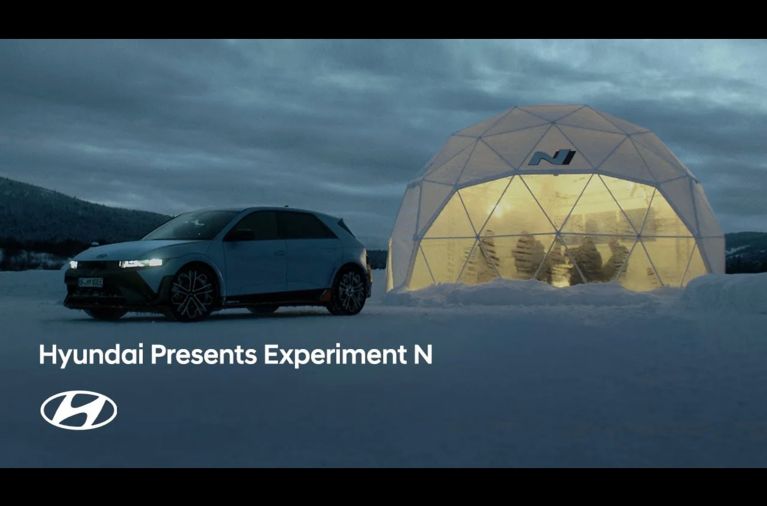- Experiment in Norway tested if driving IONIQ 5 N helps with winter blues
- Neuroscientist measured ‘Depth of Joy’, finding positive emotional boosts post-drive
- Study suggests technology can improve well-being, prompting further research
It is often said that driving sparks joy. However, when considering the dark winter conditions that affect some areas in Europe, this sentiment takes on a deeper significance. The question arises: Can driving really have a positive effect against the winter blues?
Against the backdrop of Rjukan, Norway – where winters can stretch almost six months long, temperatures frequently sink well below the negatives, and the sun is barely ever seen, a social experiment was conducted to answer that question.

Rjukan, Norway
Over four days, a selected group of participants from Rjukan, Norway and the surrounding area, who struggle with seasonal affective disorder had the opportunity to take IONIQ 5 N for a spin. The results explored the potential of this high-performance electric car to uplift spirits and bring joy, particularly in the context of the winter blues.

Experiment N: IONIQ 5 N takes excitement to new levels
Measuring Depth of Joy
To uncover the potential of IONIQ 5 N, the experiment brought in neuroscientist Shani Tal to measure ‘Depth of Joy’, or ‘DOJO’ – a new way of exploring the emotional impact of driving IONIQ 5 N.
IONIQ 5 N was the perfect model for the experiment as it represents a new segment of driver-focused, high-performance electric cars with new technologies and elevated racetrack capability. Boasting a maximum power output of 650 PS and a torque of 770 Nm, IONIQ 5 N can accelerate from 0 to 100 km/h in just 3.4 seconds and reach a top speed of 260 km/h. Enhanced with features like N Grin Boost, N Drift Optimizer, and N Launch Control, this high-performance electric car delivers pure excitement.
The experiment was set up to delve deep into the participants’ psyche, focussing on a range of biometric measurements to gauge DOJO. Through the lens of neuroscience, Tal and her team applied the Arousal-Valence Matrix to map the emotions of the participants. The model uses two dimensions of affective responses, valence – which determines whether the experience is perceived positively or negatively – and arousal – the intensity of the experience.
The experimental design encompassed three crucial phases: baseline measurements taken before the test drives, measures during the test drives, and post-test-drive assessments about long-term effects – each punctuated by questionnaires and detailed biometric recordings.
As participants embarked on their test drives, the anticipation was visible, with each moment captured by video recordings and biometric sensors. With a hypothesis grounded in the expectation of heightening DOJO during the test drives, Tal’s team anticipated a representation of DOJO that encapsulated both valence and arousal dimensions of affective responses. The results were hypothesised to reveal a surge in DOJO during driving, followed by a sustained elevation post-experiment.



Looking at the results
Through a comprehensive analysis of both physiological and self-reported data, the experiment unveiled compelling findings associated with driving IONIQ 5 N against a wintery background.
Quantitative analysis revealed a resounding 75 per cent of drivers experienced a notable positive emotional response after their test drives. On average, participants showed a remarkable 28-per-cent increase in the exploratory DOJO metric compared to baseline with a positive reaction range of up to 67 per cent after the test drive, hinting that IONIQ 5 N can evoke positive emotional responses across a diverse spectrum of participants.

Qualitative data echoed these sentiments, with 87.5 per cent of participants reporting feeling more positive after driving IONIQ 5 N compared to baseline. This alignment between subjective experiences and physiological responses reaffirmed the model’s potential to enhance emotional well-being.
Among the various biometric measurements, EDA emerged as the most influential, displaying an average change of 22 per cent across all participants. Following closely, front alpha asymmetry exhibited a notable 17-per-cent increase on average, indicative of more positive emotional processing.
HRV analysis unveiled a decrease in arousal for 62.5 per cent of participants, with an average decline of 14 per cent post-driving. The data confirms that driving IONIQ 5 N takes DOJO to new levels.
While these findings provided a compelling foundation for the concept of DOJO as a theoretical framework for assessing emotional responses, the experiment also emphasised the need for further research and validation. Nevertheless, the results stand as a testament to Hyundai’s commitment to innovation and its unwavering pursuit of enhancing the human experience through cutting-edge automotive technology.
Sparking joy
In this experiment, the concept of DOJO was measured for the first time – a milestone in exploring emotional responses to driving experiences. DOJO emerges as a metric that offers insights into the varied emotional reactions following driving IONIQ 5 N amidst Norway’s challenging winter conditions.
While bioanalysis in the context of driving is not entirely novel, the experiment’s unique focus on winter weather and its impact on participants suffering from depressive symptoms is groundbreaking. This makes the endeavour a pioneering exploration into the emotional dynamics of everyday individuals navigating icy roads and dark conditions.
Beyond the automotive context, the experiment stirs up profound questions on the intersection of human emotion, technology, and environmental factors. It opens the door to further research into the broader implications of biometric analysis in understanding and enhancing human experiences in diverse contexts.
Ultimately, the commitment to innovation goes beyond technological advancement, resonating with a deeper understanding of human nature and the potential to raise emotional well-being – even in the darkest of conditions. On contemplating the implications of DOJO, the experiment serves as a model for future exploration of technology and human emotion.
For more information, please visit https://www.hyundai.com/eu/ioniq5-n-never-just-drive.html.
Disclaimer: CO2 and emissions data
- Electricity consumption combined for the Hyundai IONIQ 5 N 84.0 kWh (21” alloy rims) with 4WD in kWh/100 km: 21.2; CO2 emissions combined in g/km: 0 (WLTP)















